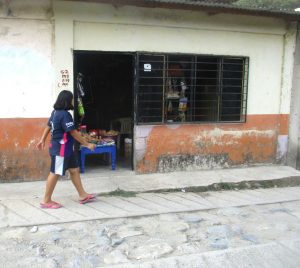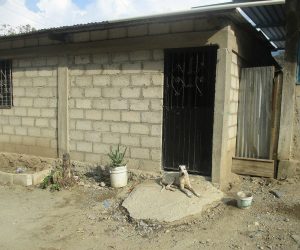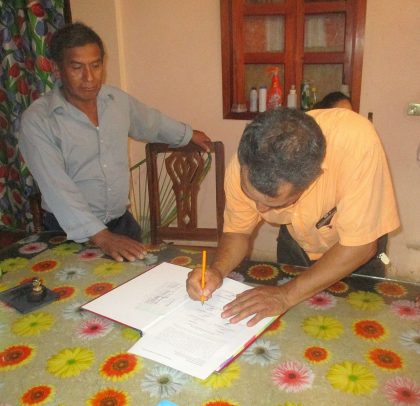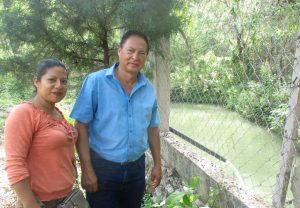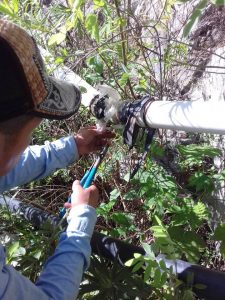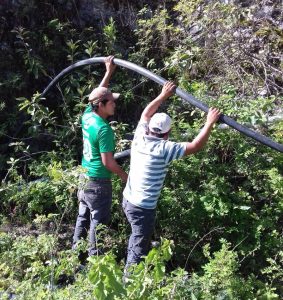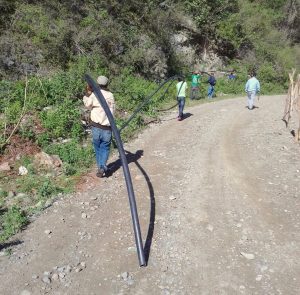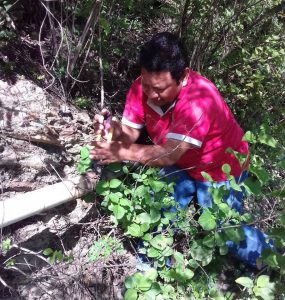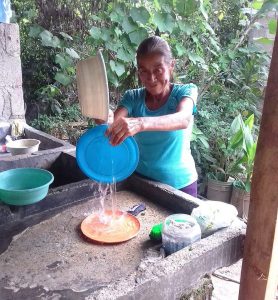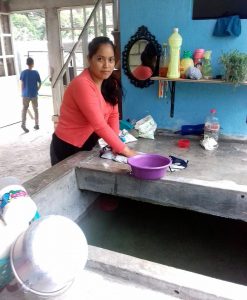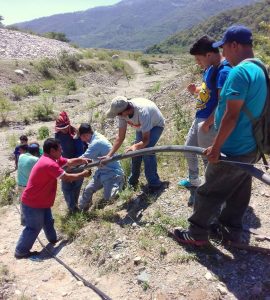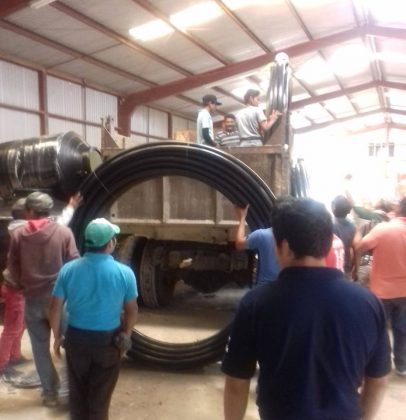This project is made possible through the partnership of WATER CHARITY and the NATIONAL PEACE CORPS ASSOCIATION.![]()
This project has been completed. To read about the conclusion, CLICK HERE.
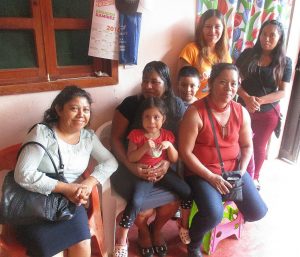 Location
Location
Xelaju Ampliación, Los Pinos and Barrio Reforma, Motozintla, Chiapas, Mexico
Community Description
Many years ago, people living in three neighborhoods on the edge of the city of Motozintla formed their water committee in order to find a way to bring water into their homes. Today there are 70 families associated with the organization. Originally, they purchased a beautiful spring from the Ejido (peasant government) and have enjoyed the abundant, clear water for decades.
The homes are located in the neighborhoods of Xelaju Ampliación, Los Pinos and Barrio Reforma. The standard of living is very poor. The people in the association make their living as best they can, with the majority of the men working as day laborers when work can be found. Many have parcels of land in the hills where they grow corn during the rainy season to provide their families with the staple tortillas for the year. A few people have tiny storefronts in their homes where they sell Coke, soap, and snacks. Some families rely on the money sent by family members working in the United States as undocumented workers.
Problem Addressed
At the end of the dry season, the spring does not produce enough water for this large number of households. The water association has secured permission from the authorities to pipe water from the river nearby into the large pool where the uptake is for two months until the rains begin. They have tested this water, and while it is not suitable for cooking or drinking, it is fine for other household uses. This measure is being taken this year for the last weeks of the dry season until the rains begin and the clear water of the spring begins to bubble up from the subterranean river.
The hose that was installed years ago has deteriorated to the degree that it is no longer functional. There are innumerable leaks along the 3-kilometer length from the spring to the first homes. Usually, people use an old inner tube to bandage cracks but the association’s “fontanero”, the person in charge of maintaining the water system, reports that he cannot keep up with the damage as new cracks form in the old hose frequently. Roaming cattle are drawn to the puddled water where there are leaks and cause further damage to the hose when they try to pry it open with their hooves.
When people live day to day without a stable income, unexpected events like an illness or the unavoidable need to repair one’s home can be a great difficulty. As a result of their situation of poverty, they cannot afford the expense of upgrading their hose even though the lack of water further exacerbates the challenges of living in poverty.
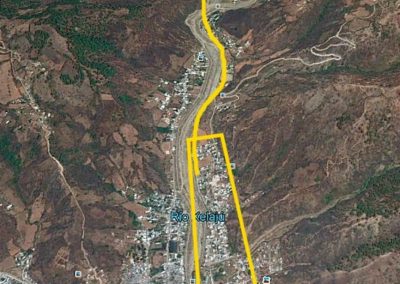 Project Description
Project Description
This project is to build a water system to serve 3 neighborhoods.
The work will consist of laying down 3 kilometers of 2-inch polyduct hose. PVC connectors will be used to join sections of hose and brass rings to securely fasten each section of hose to the connector to prevent vandals from disconnecting the hose. This has worked very well in other places to prevent the water pressure from forcing the joints apart. No structures will need to be built.
A heavy-duty uptake filter manufactured by Sexto Sol will eliminate the problem of leaves and debris clogging the hose. This has worked very well in other projects.
This is a simple project which can be accomplished quickly. The men are already organized and ready to do the work. The river valley is relatively flat, and the hose follows a good dirt road which will allow the supplier to deliver the hose directly to the places where it will be used at no additional cost.
Water Charity funds will be used to pay for the materials and skilled labor.
Project Impact
350 people will benefit from an ample supply of safe water.
Project Management
The project will be administered by Tamara Brennan, Ph.D. of The Sexto Sol Center for Community Action, an award-winning non-profit that has had a permanent presence in the region since 1997.
This project is the 17th water system project in the ongoing Sierra Madre Water Program, a comprehensive effort to improve water access in the underserved and impoverished Sierra Madre de Chiapas region of Mexico, spanning the border with Guatemala.
Monitoring and Maintenance
The people are well organized and are represented by elected leaders who direct the communal work that members do cooperatively. From small contributions from each family, they pay the fontanero to maintain the water system. He also regulates the use of the water which in this dry region must be rationed to ensure that all families receive an adequate supply for their household needs every week. They have recently built a formal structure around the spring to prevent people from contaminating the waters.
Project Funding
This project has been fully funded through the generosity of Michael and Carla Boyle, of Nelsonville, OH.
Please donate to the Sierra Madre Water Program – Mexico & Guatemala. Your contribution will allow us to continue to do important projects such as this one.
Conclusion of Asociación de Agua Chapultepec Water System – Mexico
This project has been completed under the direction of Tamara Brennan, Ph.D. of The Sexto Sol Center for Community Action. To read about the start of the project, CLICK HERE.
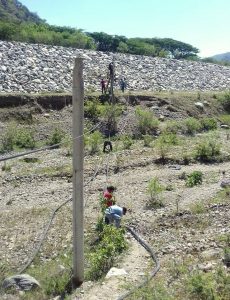 The project was designed to build a water system to serve 3 neighborhoods.
The project was designed to build a water system to serve 3 neighborhoods.
Tamara reports:
The project to upgrade the damaged water system for the Asociación de Agua Barrio Chapultepec has been successfully completed. As a result, 70 families living on the edge of the City of Motozintla now have water on tap. The continual worry about water is finally over for them.
The project proceeded easily once the materials were delivered. Teams of men worked together to dismantle the damaged PVC pipes that had been patched with plastic bags and baling wire for so many years. These were replaced with the flexible hose that will serve the communities for decades. The hose was suspended
from tall concrete posts over the riverbed to protect it from torrential rains. They greatly appreciated the custom built water filter that we provided to them for the uptake into the water system. This will prevent leaves and debris from entering the hose. Our design is much better than the typical filters sold locally that corrode quickly and fill up with sand that has to be cleaned out every few days.
It should be noted that the rainy season of 2018 has been extremely dry. For weeks at the height of the growing season there was no rainfall causing significant crop failure over the Sierra Madre region and Guatemala. Corn is the traditional staple of the diet for these people. This coming year families will not have their corn harvest to rely on for food. Fortunately, with the water now available, they are better equipped to keep vegetables and fruit trees watered when the heat of spring comes.
However, as a result of the extreme drought, at one point the very large natural pool that the Chapultepec Water Association has used as a source of water for many years dried up. This had never happened before. When the rain finally began to fall again, the water level rose to its normal state. Nevertheless, people are concerned about the impact that this drought will have on the availability of water in April and May. For this reason, the water association decided to look for an additional source of water farther up the slope as a backup that will feed into the original pool.
The leaders of the water association came to the Sexto Sol office to formally offer their thanks for this significant improvement to the lives of the families they represent. They said that people feel tremendous relief that the difficulties are over. They offer their heartfelt thanks to Michael and Carla Boyle and Water Charity for making this project possible.
We extend our thanks to Tamara for completing this important project, and for her outstanding work in the region. We are also grateful for the continuing support of the Boyles.
